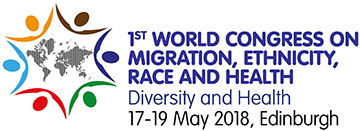Edinburgh Declaration 19th May 2018 on Migration, Ethnicity, Race and Health
The 1st World Congress on Migration, Ethnicity, Race and Health with over 700 participants from over 50 countries, is a landmark in the field of Health, bringing together different disciplines across the globe with the aim of fostering unity and cross fertilisation of ideas through an integrated dialogue on issues related to migration, ethnicity, race, indigenous and Roma populations.
We, the participants of the 1st World Congress on Migration, Ethnicity and Race and Health from over 50 countries, gathered in Edinburgh from 17th to 19th May 2018 DECLARE:
Movement of people within and across countries is, has been, and always will be an essential ingredient of human survival, success and prosperity
Migration and diversity offer many benefits globally and within countries, when the associated and often momentous challenges are overcome
Health and wellbeing are influenced enormously by the historical and political context, the composition and changing nature of the population and the organization of services in a society
Integrated dialogue on issues related to migration, ethnicity, race, indigenous and Roma populations is vital
The way people are defined and categorized by themselves and others is often a power struggle with implications for civic society, research, policy and practice and requires continuing debate
Racism, xenophobia and prejudice, discrimination, exclusion and exploitation damages the mental and physical health of individuals and groups, both minorities and majorities alike
Attention is required to meet the needs of the most vulnerable groups including survivors of torture, trafficked people, migrants in irregular situations, refugees and asylum seekers, and to prevent violence against women and girls.
The study of variations and differences in disease patterns and distributions provides essential scientific knowledge and important lessons for health policy and practice
An interdisciplinary approach is essential for understanding and tackling ethnic and racial inequities and ensuring sound ethical foundations for actions and subsequent policies
Investment in migrant and ethnic minority health and health care provides many benefits, including those going beyond health itself, and exceeds the costs incurred
WE RECOMMEND
- Eliminating barriers to access to healthcare and promoting protection of health of all people on the move, including those in an irregular situation, needs to be prioritised
- The full participation of migrants, ethnic minorities, indigenous populations and Roma in policy development, service planning, health care delivery, and research & evaluation is vital
- Relevant and appropriate data are required urgently for policy makers and service providers to tackle inequities
- Harmonization of, and agreement on, definitions and concepts should be sought by building on the consensus achieved at MERH 2018
- Strengthening collaboration between institutions, organizations and countries aimed improving the health of migrants and ethnic minorities
- A Global Society should integrate academic, professional and community work on health and health care in this field
